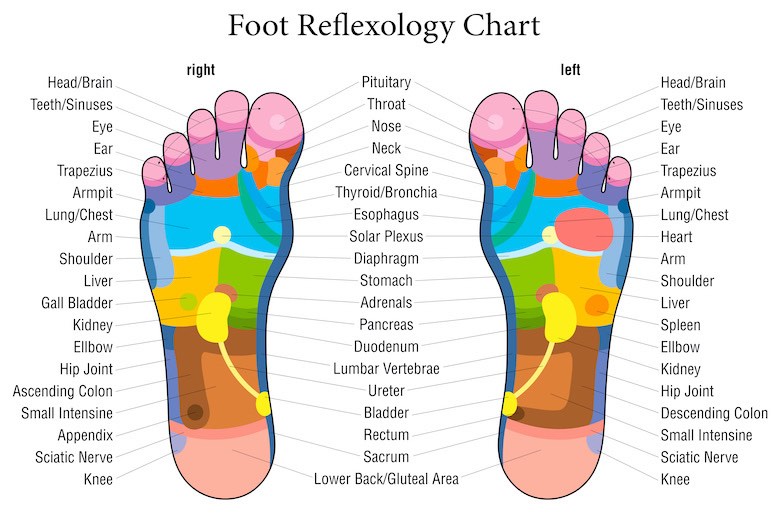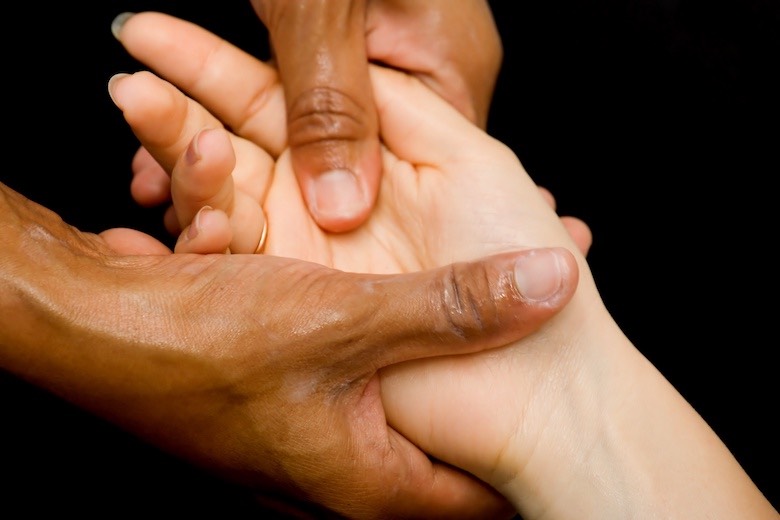


Reflexology, also known as zone therapy, involves applying pressure on specific reflex points on your feet, hands and ears. Reflexotherapy massage is based on the principle that these "reflex" points correspond to different organs and systems throughout the body. Reflexologists can treat a specific part of the body by stimulating the corresponding point on the feet, hands or ears and thus promote healing.
Somewhat similar to acupuncture or acupressure, reflexology massage therapy connects spots on the outside of your body to the body's inside organs, glands and systems. While acupressure and acupuncture use points throughout the body, reflex massage focuses only on the feet, hands and ears.
Reflexology massage has been a popular complementary therapy to medical treatments that was first recorded in ancient Egypt in 2330 BC. It is renowned for alleviating pain, relieving stress and improving overall well-being.
While it seems it started in Egypt, we are more familiar with its use in China.
According to Chinese belief, every person has qi (or chi) – life energy that flows through the body. When you are stressed, anxious or filled with negative energy, your qi gets blocked, leading to an array of illnesses. One way to unblock qi and restore balance is by undergoing reflexology, hence it is sometimes called qi reflexology or chi reflexology.
There are a few theories about the exact way reflex massage therapy works, but the main concept of modern reflexology originates from Zone Therapy.
According to it, the body contains 10 vertical zones, five on the left and five on the right. Each 5 toes on our feet reflect the 10 body zones and the body parts and organs that fall into each zone.
Practitioners of the zone theory believe that pressure on the zones of the feet and hands allows them to access specific body parts in the corresponding body zone and target the underlying cause of pain.
Another theory is based on the concept that there are 7,000 nerve endings in the human foot and each of them is a reflex point that corresponds to a body organ or system. Reflexologists know which reflex points to stimulate by carefully learning reflexology maps in which each point on the soles of the hands and feet corresponds to a specific body part (there are no vertical zones here). For instance, it is suggested that stimulating the tips of your fingers can alleviate headaches and sinus issues. Applying pressure to the interphalangeal joint crease on your thumb is said to be beneficial for thyroid problems, while pressure to the bridge of your foot can alleviate upper back issues.
Your therapist might use the first session to get to know you and learn about your diet, lifestyle and any health conditions you may have. Based on the information you provide, they will decide whether to work on your feet, hands, ears or any combination of those.
A reflexology treatment normally lasts between 30 minutes to an hour. Afterwards, you will feel calm, energised and rejuvenated.
Additionally, your therapist might give you advice on how to perform reflexology at home in between your scheduled sessions.
You can enjoy an array of reflexology massage benefits including:
Anecdotal evidence even suggests that it can improve fertility.
However, while reflexology therapy can certainly be beneficial, it should never be used as a sole treatment for any health problem you may have. Reflexology is designed as a complementary treatment, so always consult your primary care physician first before you attempt to treat any ailments with this therapy.

Although they may seem similar at first, reflexology therapy massage and foot massage are not the same things. Foot massage is all about movement, with your therapist gliding their hands over your feet and manipulating the muscles to improve circulation.
On the other hand, reflex massage is about targeting specific reflex points. Your therapist will apply and hold pressure to specific points on your feet, sometimes making small, circular movements to increase blood flow. Additionally, they might not even focus on your feet. As discussed, reflexology massage can be applied to hands and ears as well, so your reflexology experience might be vastly different.
Reflexology is a safe, gentle and non-invasive treatment that can be given even to those suffering from severe health issues.
With this in mind, you should still consult your primary care physician before scheduling your treatment at the reflexology spa in case you have:
If you are PREGNANT, make sure to inform your primary doctor and reflexologist before taking on reflexology. There are certain points in the hands and feet that can induce contractions.

Reflexology massage prices can vary wildly from one therapist to another, the length of the session and whether you want additional services such as aromatherapy, for instance.
As a general rule of thumb, the prices are similar to any other massage type, but you will have to check with your chosen therapist.
Massage and reflexology require great skill and experience. Therapists need to go through rigorous training to understand reflex zones and learn how to apply pressure properly. Fortunately, finding a licensed reflexologist near you has never been easier.
Choose your city below find the nearest reflexology massage and schedule your appointment in seconds.